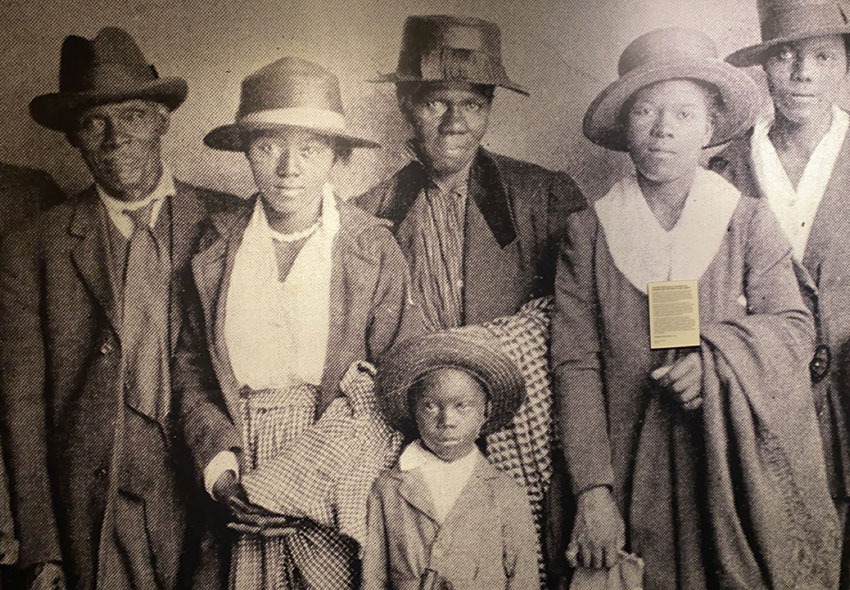Thirty-six students of the African-American Youth Initiative visited The DuSable Museum located in Chicago on Dec. 15. The African American Youth Initiative (AAYI) is a Kenosha Unified School District initiative that has resulted in broad collaboration with family and community partnerships, providing consistent and sustainable school and work success for African American youth with a mission “to empower and engage the African American Youth by breaking the educational, cultural, and social divide through advocacy and education that ensures long-term success and stability in family, school, work, and community.”
The DuSable Museum, named to honor Haitian-born founder of Chicago Jean-Baptiste Pointe DuSable, welcomes visitors to its home in Chicago’s historic Washington Park to experience its innovative and timely exhibitions and powerful and transformative educational programs, which together place the African American narrative firmly within the broader context of U.S. history. According to the museum’s website, the DuSable is “a convener; a point of connection; and a place where difficult conversations lead to reconciliation and renewal. And, as a beacon of strength and a refuge of reason, the museum is a vital part of a socially equitable reconciliation of our nation’s historic divisions.”
The trip was organized by School Social Worker and AAYI Lead Tessa Thompson, Coordinator of Diversity/Student and Family Engagement Yolanda Jackson-Lewis, and Case Manager/Lead for AAYI Eric Hopkins, along with co-advisors for AAYI Darien Parks-Knight and Abdual Hilton and support from DJ Mr. 262.
“This field trip was a powerful experience and one that is continuing to be reflected among all who attended,” Thompson said.
When students asked what they learned, student shared the following responses:
- Harold Washington died from a heart attack not poison.
- I learned about the black panther groups and how the police treated them brutally
- Harold Washington was the first African American mayor of Chicago known as the 51st mayor !
- I learned how slaves were chained up and shipped in the boats, I didn’t know they laid straight and chained up
- I learned about the march on washington and the speech Martin luther king gave
- I learned more about the culture and I learned more about the march.
- I learned that the museum is really based on our skin color and basically everything people had gone through back in the day because of our color and things they fought for.
- I learned more about the march.
- The story of Fred Hampton
- About how many people that died while they were bringing us to America for slavery
- I learned about ruby bridges again
- I learned about Emmett Till. And how he was brutally attacked for false accusations.
- Learned more about Chicago’s black mayor
Students also shared the following when asked, “Did attending the Museum influence your thoughts on Black Culture positively or negatively and why?”
- It influenced my thoughts on black culture positively because it made me try to understand the things we went through because of our skin color and it made me respect the people who have gone through it and myself as well
- Positively because it educated me more on our history and helped me further see/witness our ancestors’ struggles back in the day.
- Attending the museum did in fact influence my thoughts on black culture positively. It made me have a thankful thought on the way we have more freedom. Blacks weren’t treated right. The things they used as objects to label us was outrageous.
- The trip influenced my thoughts positively because it showed me a lot of new info
- it influenced my thoughts positively because i never really looked it went into the march and when i did the virtual reality and I saw what it was really like and the speech was like
- Positively because it opened my eyes to all the things our people went through.
- Attending the Museum helped me positively because I didn’t know anything about half of the stuff we saw and I know so much more.
- Yes it influence me in a positive way because it’s things I didn’t know that happened back then in black history
- Positively, It’s always good to know history that changed the world.
- Me definitely positively, because knowing about our culture and how strong they were inspire me to be stronger
- Positively because I’m school they try to limit our knowledge about ourselves
- Positively because it showed me how much we have grown as a culture ourselves
- Positively. We were always treated poorly and we’ve done such great things in the world and haven’t gotten enough credit.
- Positive because I got to learn more about my culture

